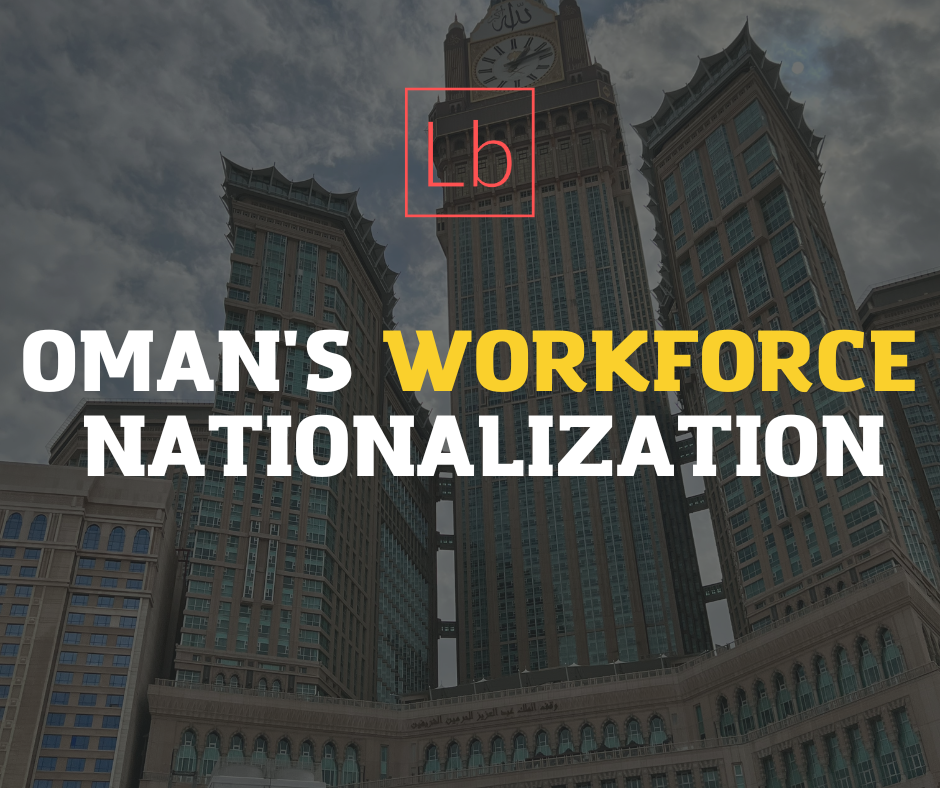
Content:
Omanisation is a national workforce initiative enforced by the Omani government to prioritize the employment of its citizens across various industries. The program began in 1988 to reduce the country's dependence on foreign workers and labor. Meanwhile, continue to create a skilled Omani workforce.
In the 1980s, the need to create more jobs for locals was comprehended. The motivation was the increased number of expatriates and the shortage of employment options for the growing population.
The introduction of Omanisation was vital in solving the unemployment many Omani citizens faced. Providing educational programs prepared Omani for the needs of the job market.
Additionally, by prioritizing local employment, the government aimed to continue encouraging companies to hire more locals. Over time, the policy evolved into a structured system with defined quotas and targets across various sectors.
The main goal of Omanization is to help Oman's citizens find employment and, in this way, make Oman's economy more diverse. Those changes made it more varied and less dependent on a foreign workforce. There are specific employment quotas for Omani citizens. They encourage businesses to hire locals in various industries like banking, telecommunications, and hospitality. Companies that meet these requirements achieve a "green card," which offers benefits such as favorable treatment in government dealings and positive media recognition.

There are several requirements apply to foreign-owned businesses. For instance, starting in April 2024, these companies must hire at least one Omani national within a year of their establishment. If companies don't meet this requirement, it can result in penalties, including restrictions on their ability to conduct certain transactions.
This regulation highlights the Omani government’s commitment to ensuring that even foreign investors contribute to local employment and workforce development.
Omanisation is closely tied to Oman’s Vision 2040. Vision is a long-term strategic plan that aims to diversify the economy. Since introducing this plan, оman has worked on creating a more diverse economy.
Additionally, Vision 2040 focuses on enhancing the quality of education and vocational training to prepare Omani citizens for technical and managerial roles in emerging sectors.
One of the biggest problems is the existing skills gap. This means that expatriates who have moved to Oman often have more experience and soft and hard skills. Frequently, expatriates are preferred for technical roles. A good engineer or IT technician can easily get a job without Omani citizenship.
Additionally, private companies are facing difficulties in recruiting qualified Omani candidates for specific specialized roles. This continues to lead to an increased focus on providing technical and vocational training to ensure that local workers are well-prepared for the demands of the private sector and are competitive in the labor market. Furthermore, collaboration between businesses and educational institutions is crucial in bridging this gap.
Another challenge is wage disparities between expatriates and Omani nationals, which can create difficulties for businesses trying to meet Omanisation quotas without facing higher labor costs.
Despite the various challenges Omanization faces, it has great potential in hiring new local workers.
Oman continues to create a more resilient economy through investing in the education of its citizens. It helps to diminish the dependence of the economy on foreign labor. By empowering Omani nationals to take on leadership roles in various sectors, the policy contributes to the creation of a more self-sufficient and independent economy.
The success of Omanization highly depends on the private sector. Private companies must continue to enforce changes and hire Omani workers. For instance, by the end of 2023, approximately 275,000 Omanis were employed in the private sector, which is about 16% of the total workers employed in the private sector. Generally, many employees are hired in banking, telecommunications, and insurance.
Also, companies continue to invest in training Omani nationals, both via training programs and on-the-job learning opportunities. Private companies are encouraged to cooperate with educational institutions to ensure that Omani students are prepared for the demands of the job market.
In addition to technical expertise, Omanisation pays attention to developing soft skills, which are vital for success in the workplace.
Teamwork is one of the most critical skills that companies seek in employees. The ability to work in team is key in contemporary society. Many organizations hire employees who work well in team.
Adaptability. Without adaptability it is difficult to work and be competitive on job market. Employers increasingly seek workers who demonstrate flexibility and a willingness to embrace change.
Ability to work in a team, and adaptability are essential soft skills, but also employees appreciate other skills like communication, leadership, flexibility, and responsibility.

As Oman continue to implement Omanisation, it faces several problems and challenges. Overcoming them is essential to success in Omanization. One problem is that companies hire more expatriates because they have more experience and better education. However, by supporting education training, the Omani national becomes more equipped to take on technical and managerial roles in various industries.
In the coming years, Omanisation will continue to play an essential role in shaping the country’s workforce and economy. Omanisation will contribute to the long-term goals of Vision 2040, encouraging a more sustainable and diversified economy.
Omanisation plays an important role in developing the Oman economy because it directly influences the job market. This strategy buttresses locals' ability to find jobs in companies by encouraging businesses to hire more Omani workers.
Although several challenges, such as skills gaps and wage disparities, persist, Omanisation has the potential to overcome them and transform the country's economy by providing more workspaces for locals. Additionally, companies continue to support education and training, creating more educated employees. It all will result in long-term economic sustainability.
Login or register to leave comments.